Learn from marketers on how to best manage social media accounts for work.
Marketers are often tasked with representing a company publicly by leveraging their own personal social media accounts. Although great for brand exposure, this creates risk when that person transitions roles and their social media account is still linked to their brand profile. Customer loss, reputation damage, and security risks are just a few additional consequences of social media misuse that businesses may encounter.
Marketers face threats as well; suspension, termination, or even legal action can result from inappropriate social media posts. And with half of marketers using both a brand/company and a personal social media account equally for work purposes, the lines between personal and professional are blurred.
Despite the complications, social media marketing delivers value to businesses. According to our recent survey of marketers, 69% indicate their company is getting high value from social media activities. Social media allows marketers to drive traffic to their work, connect with current or potential customers, explore trends, and more.
To learn about how marketers interact with both personal and company-owned social media accounts, Capterra surveyed 278 U.S. marketing and communications professionals that use social media for work.[*] This research uncovers how these account users and businesses can minimize risk when employees leave or change roles, and how they can use policy, along with the latest technology, to be successful.
/ Key findings
Marketers are taking risks with company social media account access and password management: 31% of marketers say they share management or usage of a company’s social media account. More than half (56%) of marketers only change their company account’s login credentials every two to six months.
Marketers feel entitled to post what they want on company social media accounts: 79% of marketers are comfortable freely expressing their opinions on social media for work or professional purposes. 87% of marketers agree that employees have the right to post what they want on their personal social media accounts.
However, misuse of social media accounts can have serious consequences: Nearly 1 in 4 (24%) marketers say that they or someone they’ve worked with has been disciplined at work due to social media usage. Of those, 12% have been fired as a result.
Social media account management software and dedicated policies mitigate risk and maximize ROI for company accounts: Companies that use account management software receive higher value from their social media activities—78% of account management software users report high value compared to 69% among total marketers. Those with specific policies for social media account managers are less likely to report witnessing disciplinary actions due to social media posts.
How marketers use personal vs. company social media accounts
Our survey found that marketers are posting slightly more for work purposes than for personal purposes; 62% post daily for work while 58% post daily for personal purposes.
But perhaps more notably, marketers post about work on their personal account just as much as they do on their work account, suggesting the lines between the two are increasingly blurred.
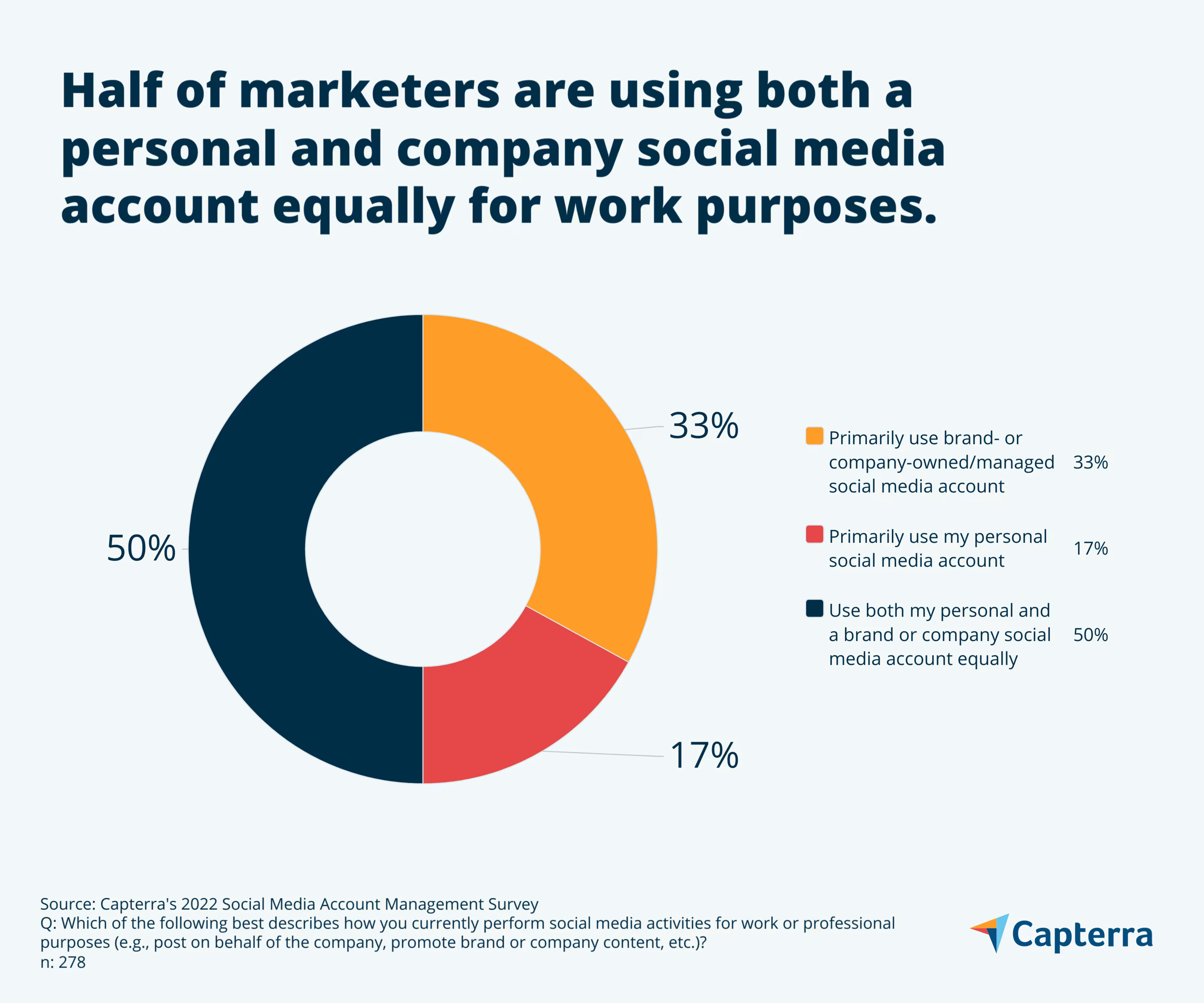
While personal account users are in the minority (only 17% of marketers primarily use their personal social media accounts for work), they use their accounts differently compared to company account users (i.e., an account setup owned or belonging to the brand or company).
For example, how and what account users feel comfortable posting about for work varies. Marketers using personal accounts for work indicate they do sometimes hide certain aspects of their identity, with income and political ideology at the top of that list:
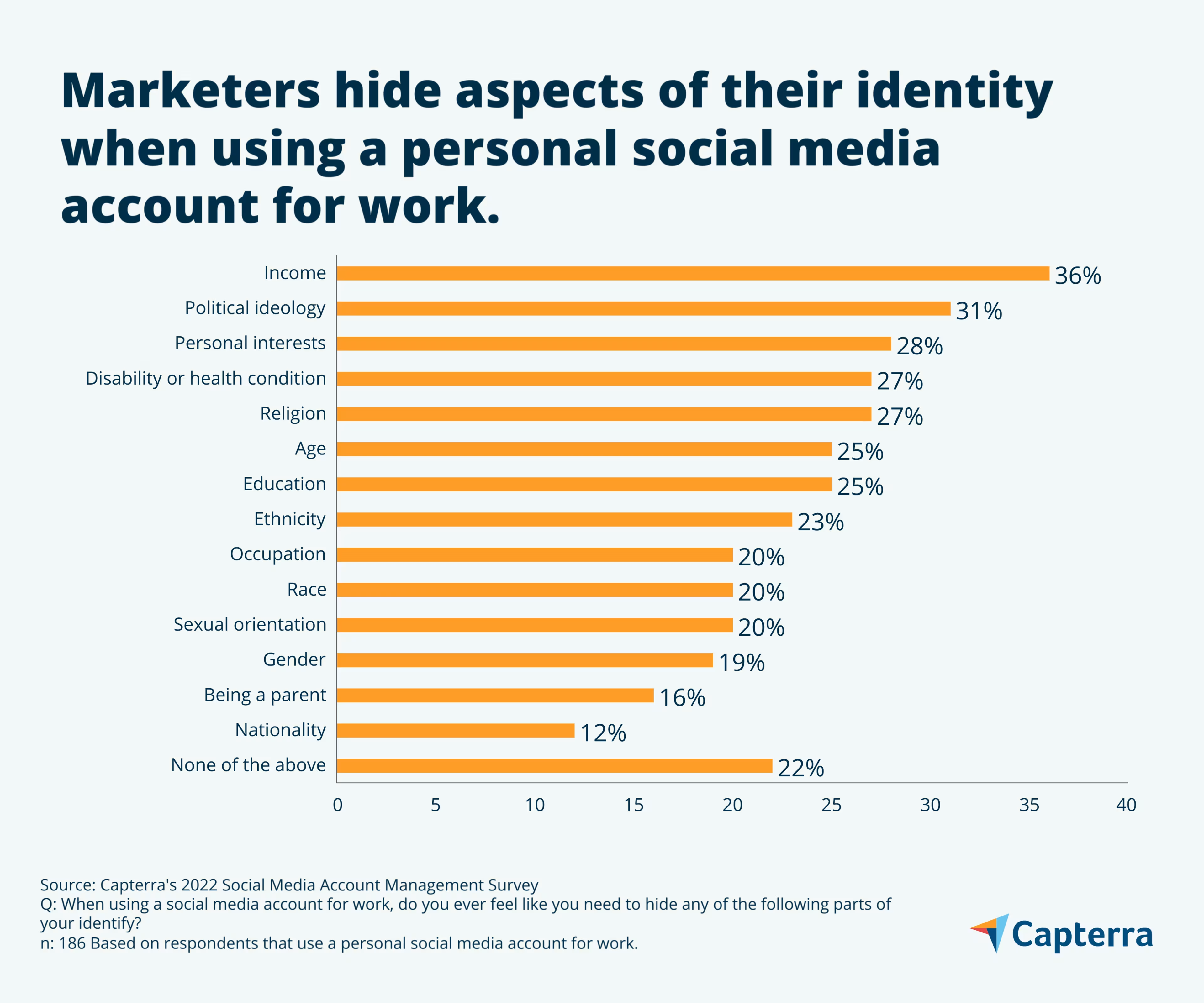
Marketers’ attitudes towards freedom of expression on social media differ by account type as well: 87% agree that employees have the right to post what they want on their personal social media accounts, yet just 63% agree with the same statement regarding a brand or social media account.
Our survey found that overall, 79% of marketers say they are comfortable freely expressing their opinions on social media for work. They are likely following their intuition and best judgment when it comes to posting for work while showing additional restraint using a company account versus their own personal account.
The way marketers update login credentials on their social media accounts also varies by the type of account. Among marketers that use their personal social media account for work, 17% say they only update their login credentials when they get locked out or can’t access their account compared to just 9% among brand or company account users:
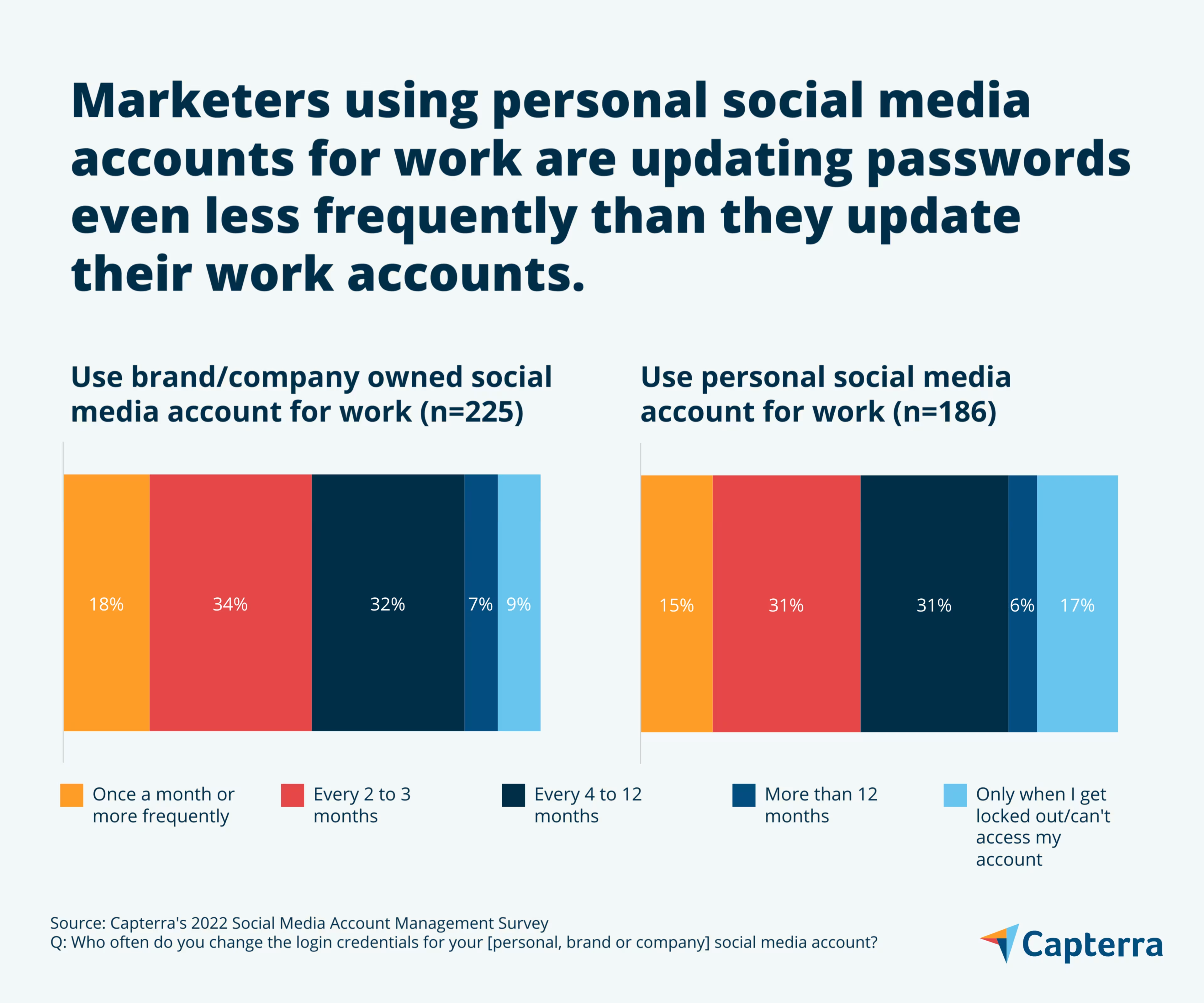
Everything considered, using personal social media accounts for work purposes comes with added risk. Your business may want to opt for creating a company account (if there isn’t one already) and never instill personal account posting as mandatory.
Let’s look at some additional problems that stem from social media account usage for work.
Issues that arise with social media accounts
What do businesses do when an employee leaves or changes roles? If an employee leaves the company and still has access to social media accounts, your business could be vulnerable to security risks or reputation damage.
When an employee leaves
In order to prevent former employees from hijacking company social media accounts, the majority of marketers (52%) say their company typically changes the login and passwords for all company accounts when an employee leaves. Nearly as many (48%) send a notice to the departing employee stating that they longer have permission to post on behalf of the company.
However, more employers should be taking the standard measures of removing employees from social media accounts when they leave or change roles. Only 46% of marketers say their company actually locks out or blocks the departing employee from all company accounts. Less than a third (29%) of marketers say their employer deletes or alters posts made by the departing employee.
Employer actions such as deleting or altering posts go against the desires of many marketers. Among marketers who use both brand/company and personal social media accounts, an overwhelming three-fourths believe they should retain control of their content even if they leave or change roles.
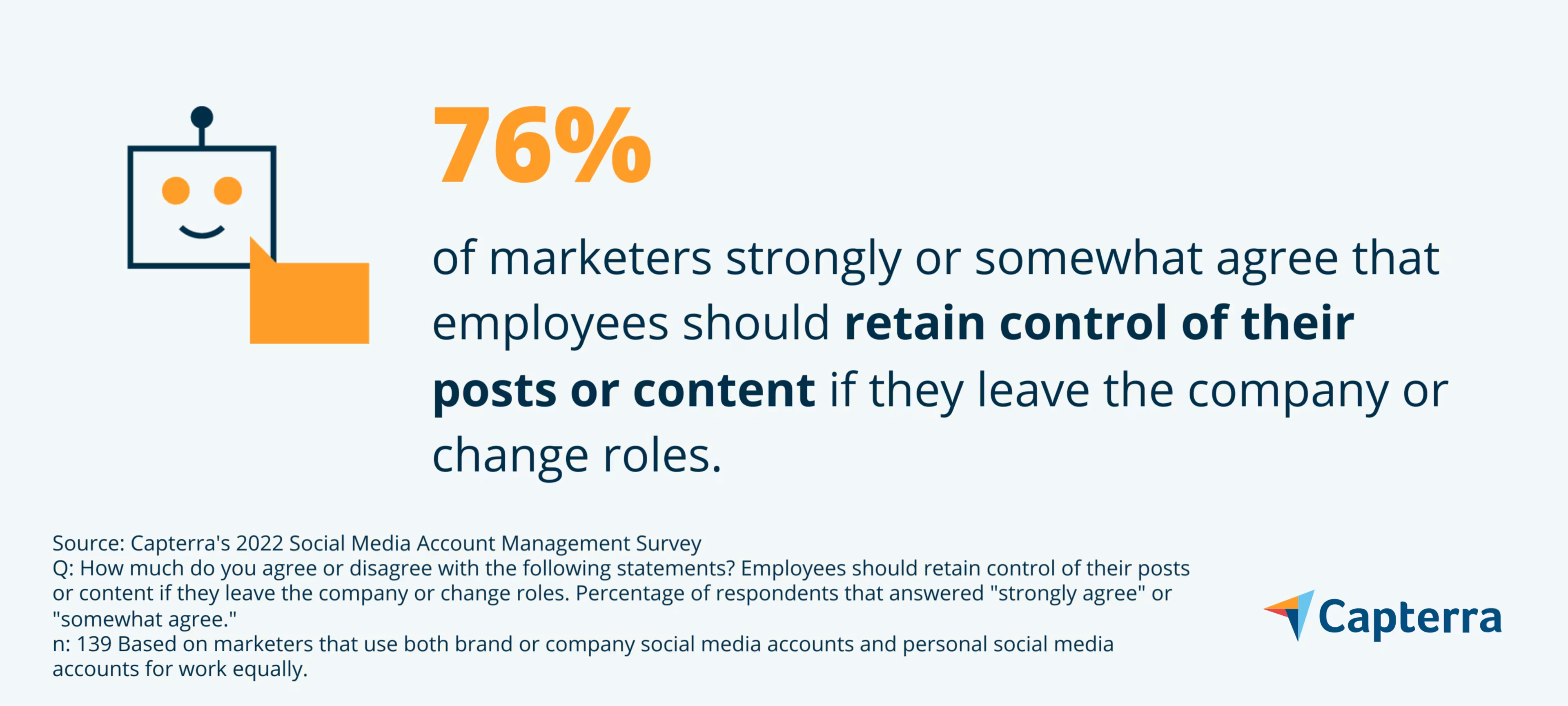
As for marketers that use their personal social media account for work, 38% indicate that their employer will contact a social network’s support team to delete or remove work-related posts or request the departing employee alter or delete work-related content or posts (34%). Clearly, employers want to retain control of work-related social media content, even when it’s coming from a personal account.
Conflicting interests when it comes to work-related posts aren’t the only issues that can arise with personal and company social media accounts. Let’s take a look at some additional issues marketers have noticed.
What you say and do can be used against you
As social media has grown in popularity over the years, more people have gotten in trouble for the way they use accounts or interact. In fact, 24% of marketers say that they or someone they’ve worked with has gotten in trouble or been disciplined at work due to social media usage.
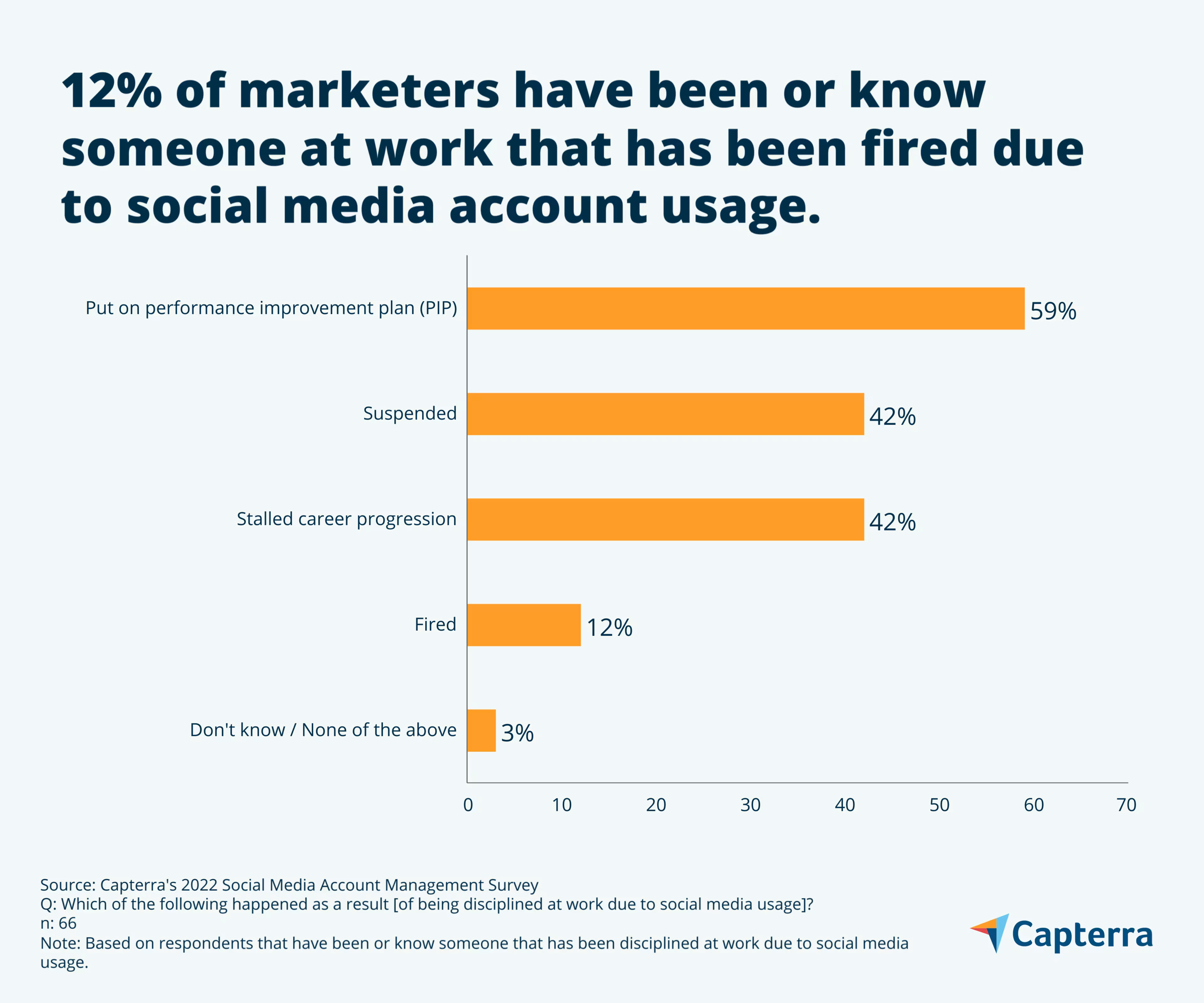
When it comes to social media for work, there’s more inappropriate posting than you would expect. Additional issues observed on social media accounts used for work include inaccurate posts (29%), posts about political or social issues (27%), posts not related to work (26%), and even posts that are critical of the business or a employer (25%):
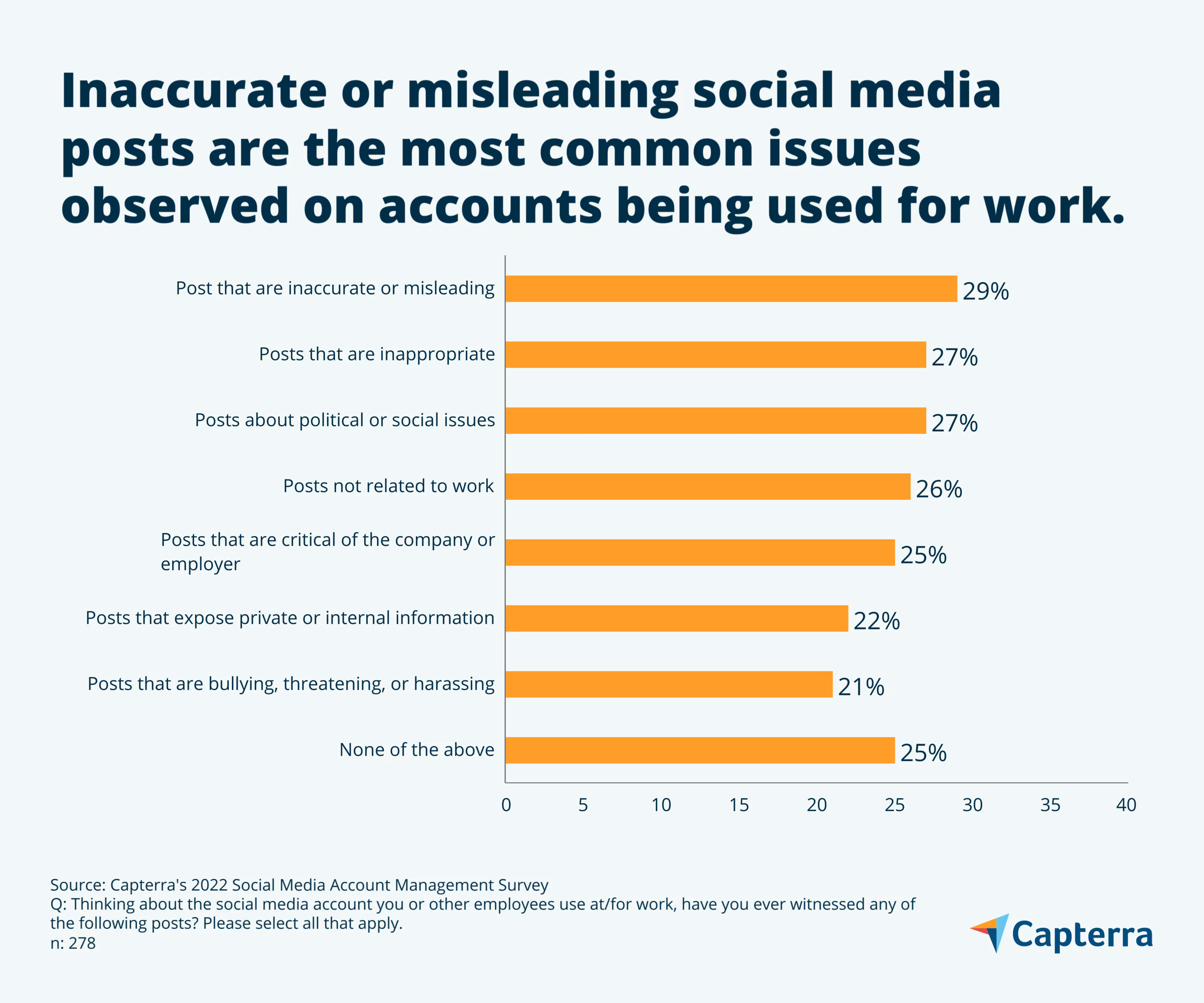
Let’s take a look at company policies to get a better understanding of how to resolve issues with social media account management.
What social media policies do marketers follow?
Company social media policy varies from business to business. Our research finds that 63% of companies have a policy for employees who are specifically responsible for managing the company’s social media, while 51% only have a general social media policy.
In fact, businesses have come a long way in creating internal policies to mitigate social media risk and establish rules around social media account management. Sixty-two percent of marketers say they are very informed about their company’s social media policies. An overwhelming 78% think their company’s policies are clear.
However, today’s marketing professionals are interested in shaping their company’s social media policies. When we asked who should create social media policies, 62% of marketers feel that employees and employers should work together to form social media policies. Only 11% of marketers feel that employers should be solely responsible for shaping social media policies.
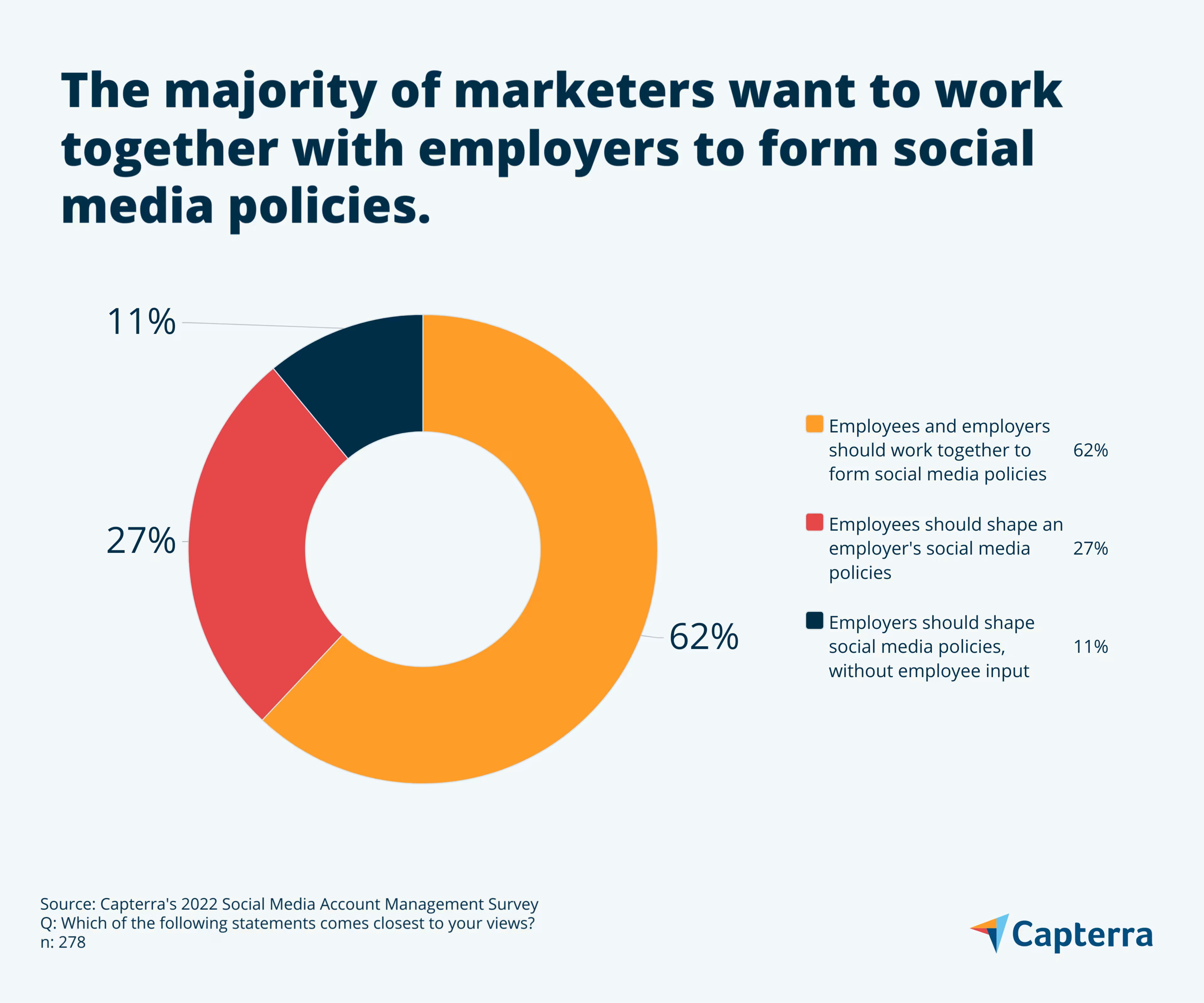
If you need help developing or strengthening your company’s social media policies to address some of the issues identified in this report, read on for tips and recommendations for creating a successful presence on social media for work.
Recommendations for marketers using social media accounts
#1. Strong social media policies help reduce risk. Make sure they cover removing account access.
Similar to companies using account management tools, those with specific policies for social media account managers also receive higher value from their social media activities—75% of companies with these policies report high value from social media activities compared to 69% among total marketers.
Additionally, companies with specific policies are less likely to report having received or witnessed discipline at work due to social media usage. This is likely because strong social media policies provide specific guidance for content shared on social media channels.
One important consideration for social media policies is account access removal. There should be spelled out procedures and guidance (for brand and personal account users) to swiftly and easily remove individuals from accounts or prevent them from posting on behalf of the company. Guidelines can include actions such as checking the employees’ social media activity, making sure you revoke a departing employee’s access to a social media account before they leave, ensuring they remove company branded images from personal social media accounts, etc.
#2. Follow account ownership and password best practices.
It’s important for passwords to be updated regularly to prevent password-related data breaches and threats. As noted earlier, most marketers are updating their social media account password every two to six months. Ideally, passwords should be changed monthly, be unique, and include two-factor authentication if possible.
With nearly a third of brand account users sharing social media accounts, there’s a need to assess publishing and access privileges. Start with an audit of individuals that have access to social media accounts and make adjustments as needed for role or job changes. Also, consider who truly needs the ability to post. It’s best to limit account access to essential or frequent account users if at all possible. If you can, limit the number of social media account admins or identify one or two primary account owners to help keep accounts secure.
A strong social media policy, along with the right technology, are key when it comes to protecting your company and yourself from security and other risks. All users (brand and personal posters) want to feel comfortable and protected when sharing on social media. As social media continues to change rapidly, users and companies alike need to stay vigilant in monitoring the state of their social media accounts, activity, and policies.
#3. Leverage account management software to get more value from social media.
When we asked those tracking performance metrics which social media software or tools their company currently uses, three in five are using account management tools. Strong social media policies and assistive technology can help marketers get more value from social media activities and mitigate risk.
Our research found that marketers with access to account management tools receive higher value from social media activities compared to total marketers—78% of companies using account management tools report high value from social media activities compared to 69% among total marketers.
Account management tools can help businesses manage multiple accounts from one place and improve visibility across an organization. Consider adopting such software (if you aren’t already) to help manage social media accounts and activities.
If you like this report, check out these additional marketing topics and resources:

